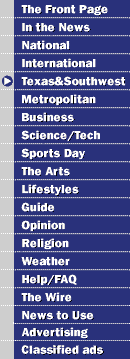|
09/10/93
ATF chief defends raid commanders; Denies they lacked training for Waco case
By Lee Hancock / The Dallas Morning News
WASHINGTON - Bureau of Alcohol, Tobacco and Firearms Director Stephen Higgins on Thursday denounced recent reports that his field commanders lacked tactical training and their Washington superiors were too detached to decide properly whether to execute the Branch Davidian raid.
Despite increasing news media reports that U.S. Treasury Department officials would like to ease him out because of the failed Feb. 28 raid, Mr. Higgins also told The Dallas Morning News that he hopes to remain as head of ATF for at least another year.
He added that he has not gotten any direct indications from his superiors at the Treasury Department that he is about to be replaced.
But six months after his agents were cut down by gunfire while trying to serve search and arrest warrants on the Waco cult, Mr. Higgins said he still cannot say publicly whether his subordinates should have known that the action had been compromised and called it off.
Although he has reached some conclusions about what went wrong, Mr. Higgins said he did not think it was proper to offer his assessment of the raid until treasury officials complete an independent review.
Mr. Higgins said he requested the review instead of ordering the internal review normally done in shooting incidents involving ATF agents because he wanted to prevent accusations that the agency might be trying to cover up wrongdoing.
Treasury officials say they hope to release the review by month's end. On Thursday, Attorney General Janet Reno announced that release of the Justice Department's review of its handling of the siege after the raid will be delayed until Oct. 1. She said the delay was to ensure that the review is thorough.
Officials familiar with the Treasury Department review have predicted that it will harshly criticize the decision by ATF commanders to execute the raid and will conclude that they should have known it had been fatally compromised after hearing a report from an undercover agent inside the compound just before the action.
An ATF affidavit filed in a Waco federal court states that the undercover agent saw Branch Davidian leader David Koresh go into another room Feb. 28 and return to tell his followers that the ATF was coming. The agent also heard Mr. Koresh vow not to be taken alive, the affidavit stated.
Raid commanders have said, however, that they did not consider the statements proof that the raid had been compromised because Mr. Koresh had made such statements before, and they saw no evidence that he and his followers were arming themselves for an ambush.
Mr. Higgins said he did not know the full scope of the undercover agent's pre-raid report until late March, when he requested his written statements after hearing reports that some agents were worried about a possible cover-up.
He said he asked ATF officials in Waco to allow the undercover agent and the raid commanders to appear before reporters and explain what had happened.
"I said, `Let's get his issue behind us. . . . There's nothing to hide here,' " he said.
That was vetoed by the U.S. attorney's office in Waco because of ongoing criminal investigations, he said. Treasury officials advised Mr. Higgins in early April not to respond even to congressional inquiries about the issue because of the impending treasury review, he said.
Some officials familiar with the treasury review have told The News and other members of the news media that it will probably conclude that Phil Chojnacki, special agent in charge of ATF's Houston division, and Chuck Sarabyn, assistant special agent in charge of the Houston division, lacked the paramilitary or tactical experience needed to make proper command decisions in such a massive law enforcement action.
Officials familiar with the review say it also will probably criticize ATF officials in Washington for being too detached from the decision to execute the raid.
Mr. Higgins disputed both assertions.
Mr. Sarabyn, the raid's tactical commander, is a 17-year law
enforcement veteran who helped develop the training programs and was trained for the ATF special response teams that executed the Branch Davidian raid, Mr. Higgins said.
Mr. Chojnacki, a 27-year law enforcement veteran, has military experience and critical incident training, helped plan security for the 1984 Los Angeles Olympics and has overseen 5,000 arrests and more than 1,000 search warrants, he said.
"This wasn't amateur day," Mr. Higgins said.
ATF senior officials scrutinized every detail of the raid plan, he said, and he repeatedly discussed last-minute details and concerns about the raid during telephone calls with treasury officials and ATF officials as late as the night before the action.
Mr. Higgins said he reviewed and approved the raid plan.
When field commanders had to decide whether to execute the raid plan, he said, "my own view is I don't see what we (in Washington) would've added to the situation."
After the raid failed, Mr. Higgins said, he tried to keep treasury officials fully informed of what he was learning from officials in Waco, even reporting rumors circulating among field agents.
Although some treasury investigators have contended that senior ATF officials in Waco did not fully inform Mr. Higgins about what had happened, the ATF director declined to assess his subordinates' management of the post-raid crisis.
"It wouldn't be fair to them," he said.
Mr. Higgins said he also expects the review to address concerns of some ATF agents that senior agency officials in Waco "closed ranks" and misled the public about the reasons for the raid's failure.
But he said he knows of nothing to support that claim.
Mr. Higgins said he expects that the treasury review will
candidly assess his performance.
"I think I did it with as much openness, honesty and integrity as I could. If that's not satisfactory, it's not satisfactory," he said.
But he bristled at suggestions in some recent news media reports that he might have "intentionally misled . . . the public or my superiors. They can question my competence, but that goes to integrity," he said. "If there's a conclusion that I somehow knowingly misled the public or them and that comes out in the final (treasury review) report, I'm just saying today they'd have to make that up.'
|


![]()



